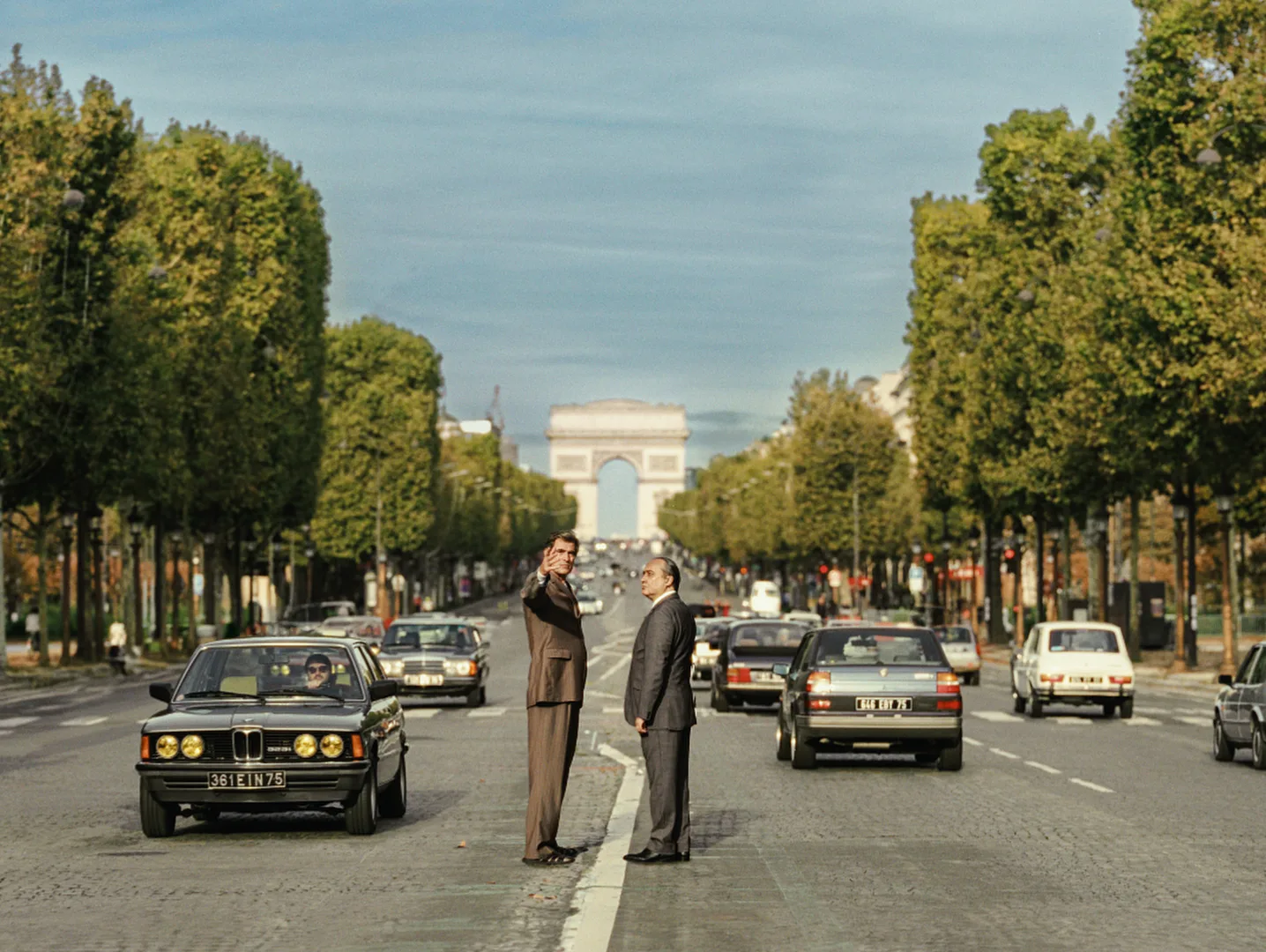
Cannes 2025: Dossier 137, A Pale View of Hills, The Great Arch | Festivals & Awards | Roger Ebert
A confidently made procedural from the Competitors program for this yr’s Palme d’Or ought to have interaction with audiences outdoors of Cannes greater than two movies that misstep sufficient that they’re prone to wrestle once they depart the ocean air on the Croisette.
Stated procedural is Dominick Moll’s “Dossier 137,” a research of police violence and corruption that writes itself right into a nook after which, brilliantly, forces us to sit down there. Whereas watching this ticking clock of a movie, I saved questioning how Moll was going to achieve a satisfying endpoint in a narrative with no winners, apprehensive he would succumb to the widespread downside of filmmakers who attempt to craft unbroken tales a couple of damaged system. The whole movie works however his masterstroke, with out spoiling, is the place Moll lands: On a shot of such miserable concession concerning the impossibility of resolving the conflicts that outline this movie that it’s going to hang-out me for a while.
Léa Drucker (“Final Summer time”) is usually wonderful as Stéphanie, an investigator with IGPN, the French model of inside affairs. Stéphanie is a well-known movie character on this story primarily based on precise occasions, incorporating footage from and impressed by the “Yellow Vest Protests” of 2018. In December of that yr, the streets of Paris grew violent round protests of a gasoline tax hike from French President Emmanuel Macron. Stéphanie is approached in 2019 by a mom whose son was horribly injured by a riot gun. His skull was caved in and he almost died. There was no justice for him. Can Stéphanie be the great apple and discover the individuals accountable?
Moll retains us by Stéphanie’s aspect your complete movie, resulting in an successfully locked POV. We don’t know something in regards to the case till Stéphanie learns it, whether or not via speaking to witnesses, having access to CCTV footage, or interrogating potential assailants. We meet her ex-husband, who remains to be a cop, and her son, who asks her why nobody likes the police. At occasions, “Dossier 137” can really feel an excessive amount of like a protection of the pressure, a solution to the query posed by Stéphanie’s son within the kind of a remaining hero in an official uniform, however Moll permits cynicism to creep into the procedural, exploding in a unbelievable scene close to the top through which Stéphanie and her superior focus on potential bias within the case. Isn’t the very existence of the IGPN biased to its core? Her son’s father remains to be a cop. Her mates are cops. How may that not produce bias? The concept that cops investigating cops are inherently going to attempt to defend them as an alternative of discovering precise justice is on the rotten core of your complete system.
The relative predictability of “Dossier 137” will get a jolt of adrenalin via the addition of Guslagie Malanda, so wonderful in “Saint Omer.” Right here, she performs a maid who might have witnessed the crime, conscious that her place in French society makes any kind of seek for justice on her half way more harmful than it does for Stéphanie. How rapidly Stéphanie goes from by-the-numbers investigating to actually stalking Malanda’s character to get solutions feels a bit rushed, however Drucker conveys the simmering anger that fuels her inquiries. We’re keen to go down this rabbit gap together with her, at the same time as we sense there can’t be presumably be gentle on the opposite aspect.
Moll’s movie reaches its best impression after the mysteries of that night time are cleared up. Precise footage of the incident can’t even present the closure or justice that folks want as a result of cops have been skilled their method round this type of factor. One particular person’s kick is one other’s nudge together with his foot. It’s meant to infuriate us as a lot because it does Stéphanie. At the very least we don’t need to take it dwelling with us.
The masterful Kazuo Ishiguro launched the variation of his “A Pale View of Hills” on the primary full day of Cannes 2025 by noting that he wrote it when he was solely 25 and thought of it a nasty e-book in a legacy that features only a few of these. He identified that unhealthy books are sometimes made into nice movies, which is true, however not on this case. Kei Ishikawa not solely can’t get across the points of the supply materials, he amplifies them via stagey course, flat performances, and shallow themes. A few fascinating concepts peek via however they’re buried by insincere melodrama in a movie that goals for profundity however solely finds ambiguity.

“A Pale View of Hills” takes place in 1952 in Japan and three a long time later in London. Niki (Camilla Aiko) has returned dwelling, not too lengthy after the demise of her sister Keiko, to interview her mom Etsuko (Yoh Yoshida in 1982 and Suzu Hirose of “Asura” in 1952) about her life in Nagasaki not lengthy after the bombing. The parallel arcs are outlined by the tragedies that grasp within the air—the worldwide one of the A-bomb and the non-public one of a suicide, which may really feel simply as nuclear.
When Ishikawa flashes again to Nagasaki, he provides the movie a form of dreamlike high quality, as if we’re watching a film inside a film. The interval particulars are heightened, the lighting turned up a number of levels, and even the blocking feels exaggerated. It provides us the sense that what we’re watching as Etsuko befriends the ostracized single mom subsequent door isn’t precisely what it appears, however that additionally makes these unreliable flashbacks hole. When “A Pale View of Hills” finally will get to its identity-shifting twists, it feels low cost, an unearned solution to wring feelings from a movie that hasn’t gotten there by itself.
Unreliable recollections of a time as fraught as Japan within the early ‘50s would possibly make for partaking fiction on the web page, however it takes a a lot firmer hand in movie kind than Ishikawa has right here. It doesn’t assist that the 1982 performances merely aren’t superb. Solely Kore-eda vet Hirose has any emotional pull, however the movie retains pushing us away from seeing her as a totally realized character. The misdirection and melodrama morph into one thing that’s really tough to see.

Integrity battles authority in Stéphane Demoustier’s well-made however remarkably flat “The Great Arch,” a drama that possible works a lot better to the French viewers engaged by its interval element and ode to admittedly sensible structure. Limitless battles over the way to deal with marble and the scale of pillars drain the supposed thematic thrust on this narratively uninteresting work, a film that makes its level early after which typically. Claes Bang is usually sturdy as a person so dedicated to his imaginative and prescient that even the elements of it that folks couldn’t see shan’t be altered however his character work is within the pursuit of one thing that may’t justify why one ought to watch it as an alternative of only a documentary on the identical topic.
Bang performs Johan Otto von Spreckelsen, a Danish designer who unexpectedly gained a contest to construct an enormous construction identified to some as The Dice in Paris, after which watched it destroy him. So dedicated to his imaginative and prescient, he fought with anybody who even recommended altering it, together with his challenge supervisor Paul Andreu (Swann Arlaud of “Anatomy of a Fall,” successfully perturbed via most of the movie). Surprisingly, Von Spreckelsen’s best ally can be Mitterand, however his political undoing throughout the challenge would additionally change into our hero’s.
In an odd transfer, Demoustier provides Von Spreckelsen a fictional spouse (revealing initially that she didn’t exist) solely to do nearly nothing together with her narratively aside from to offer our hero a sounding board for venting. And vent he does. Demoustier intends to valorize Von Spreckelsen’s dedication to his artistry at a time when such a factor was changing into more and more uncommon, and she or he accomplishes that lengthy earlier than the movie runs out of new issues to say. A dramatic movie about structure is an inherently dangerous proposition and “The Great Arch” will get misplaced within the particulars that Von Spreckelsen thought of so essential.


